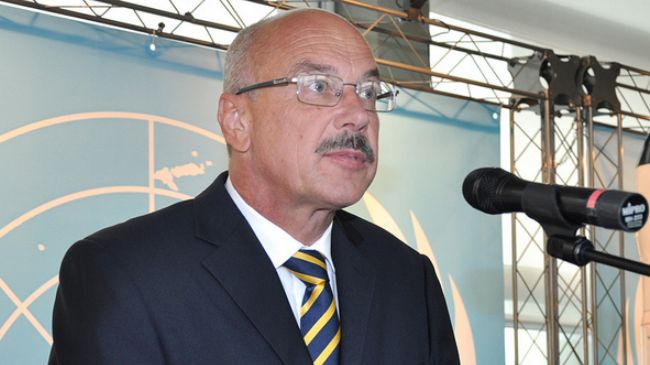By Hugh Dugan
Originally published by Fox News in the Fox News Opinion.
The placement of a Putin operative, Russian senior diplomat Vladimir Voronkov, to run the United Nations Counter-Terrorism offices is being touted as the first major reform of the United Nations Organization by its new Secretary-General Antonio Guterres.
The only reform is that Russia changed its mind against insisting on its Washington Ambassador Sergey Kislyak for this new command, probably due to his controversial meddling in DC, including the Michael Flynn matter. Nonetheless, Putin’s choice looks to be one of the UN’s most damaging setbacks in years.
Recently the General Assembly finalized the creation of a new, expensive Under-Secretary-General for Counter-Terrorism post tailored for a Russian incumbent. It was the UN spoils system at work. Voronkov had laid in wait in Vienna as head of UN offices there for several years where he helped puppeteer the “Iran Deal” Obama bought. After the Soviet meltdown and Russia’s twenty-five years of slow, geopolitical rehabilitation, Moscow’s new senior insider can now approach the gates of Oz, UN Headquarters in New York. He will settle in like a low-grade headache and eventually show Secretary-General Guterres that the UN isn’t big enough for the both.
So, this is not a real reform, as heralded by Guterres. It is a game of musical chairs in reverse, where one adds a chair when the music stops. Further, it includes taking a big chunk of bureaucratic birthday cake from the senior-most American in the UN Secretariat and giving it to its new senior-most Russian. It reminds of the Obama’s uranium gift to Moscow – twenty percent of the US stockpile.
The UN General Assembly last week finalized creation of the Under-Secretary-General post for Counter-Terrorism specifically tailored for a Russian incumbent. It was the old UN spoils system at work, involving a retrograde, Cold War invader who will undo what remains of UN relevance today.
How did things come to this?
The Obama Administration colluded with Russia to select Guterres for Secretary-General in late 2016. It was part of a trade-off intended to keep Obama’s operative, Jeffrey Feltman, at the top of the UN Secretariat’s powerful Department of Political Affairs no matter the US election. Likewise, France, Britain and China wanted to keep their senior-most operatives positioned in a Guterres administration.
Keeping Russia’s hands off “their” senior posts required creating a new senior post for Russia which had outgrown it patience exiled in secondary UN posts. So, the General Assembly decided to greenlight a customized senior post for Secretary-General Guterres to fill as he wished, in exchange for a Russian promise not to veto Guterres’ bid for Secretary-General.
Putin’s Voronkov will oversee nothing less than the UN’s Global Counter-Terrorism Strategy programming and all its pertaining optics and authorities. In fact, Moscow engineered the office’s creation for a Russian operative to regrow Moscow’s brand throughout UN Headquarters.
For the rest of the world, this merely adds an expensive chair to the U.N. table without regard for the UN’s hodgepodge counter-terrorism mandates, which have never amounted to much anyway.
If money speaks, then the UN’s Global Counter-Terrorism Strategy is barely a whisper. To date, approximately 95% of its funding has come from only one source, Saudi Arabia ($110 million).
Russia, by the way, has never given a dime to the program it now plans to command. But its new Under-Secretary General for Counter-Terrorism will do fine personally. The General Assembly has authorized a $300,000-plus compensation package for the job from the UN’s fixed budget. (The U.S. pays 22 per cent of that budget.)
Voronkov leaves his ambassadorial nestings in Vienna and Geneva after years of inflating and promoting Russia’s capacities and significance on today’s geopolitical stage. The Russian appointment marks a return to that country’s Soviet-era influence within UN Headquarters after decades of service in exile. Moreover, it will include offices purloined from the Department of Political Affairs.
Meantime, Feltman will keep his Political Affairs post for at least another year or so, long enough to qualify for a second pension. More importantly, it will keep him, an Obama appointee, at the ear of the Secretary-General well into the Trump Administration.
There is a “parallel universe” counter-terrorism bureaucracy untouched by this reform, and it exists in the Security Council. That Counter-Terrorism Committee, supported by an Executive Directorate, was created after 9/11 to bolster the ability of countries to prevent terrorist acts both within their borders and across regions.
As recently as April the Council’s committee began work on a “comprehensive international framework” to counter terrorist narratives. This is a doppelganger to the new czar’s Global Counter Terrorism Strategy and its existence proves that there is no reform at hand to rationalize UN counter-terrorism resources.
Meantime, be assured that Vladimir Putin’s version of counter-terrorism strategy—from the man abetting Bashar al-Assad’s atrocities in Syria, will get a thorough and respectful airing at the United Nations Organization.
Hugh Dugan advised eleven US Ambassador to the UN while serving as a US Delegate there from 1989 to 2015. Currently he is Sharkey Distinguished Visiting Scholar and Adjunct Professor at Seton Hall University’s School of Diplomacy and International Relations. Views or opinions expressed are solely those of the author and do not necessarily represent those of any other entity.
